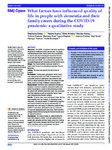What factors have influenced quality of life in people with dementia and their family carers during the COVID-19 pandemic: a qualitative study
| dc.contributor.author | Daley, S | |
| dc.contributor.author | Akarsu, N | |
| dc.contributor.author | Armsby, E | |
| dc.contributor.author | Farina, Nicolas | |
| dc.contributor.author | Feeney, Y | |
| dc.contributor.author | Fine, B | |
| dc.contributor.author | Hughes, L | |
| dc.contributor.author | Pooley, J | |
| dc.contributor.author | Tabet, N | |
| dc.contributor.author | Towson, G | |
| dc.contributor.author | Banerjee, Sube | |
| dc.date.accessioned | 2022-02-25T12:24:03Z | |
| dc.date.available | 2022-02-25T12:24:03Z | |
| dc.date.issued | 2022-02-10 | |
| dc.identifier.issn | 2044-6055 | |
| dc.identifier.issn | 2044-6055 | |
| dc.identifier.other | e053563 | |
| dc.identifier.uri | http://hdl.handle.net/10026.1/18845 | |
| dc.description.abstract |
<jats:sec><jats:title>Objectives</jats:title><jats:p>The COVID-19 pandemic has led to significant disruption to health and social care services. For people with dementia and their family carers this is problematic, as a group who rely on timely and responsive services to live well with the condition. This study has sought to understand how COVID-19 has affected the quality of life of people diagnosed with dementia and their family carers.</jats:p></jats:sec><jats:sec><jats:title>Design</jats:title><jats:p>Our mixed-methods study was nested in a larger cohort study of an education programme, Time for Dementia.</jats:p></jats:sec><jats:sec><jats:title>Setting</jats:title><jats:p>The study took place in the South-East of England.</jats:p></jats:sec><jats:sec><jats:title>Participants</jats:title><jats:p>Existing study participants, family carers were approached about the COVID-19 nested study. A purposeful sample of participants were invited to take part in in-depth qualitative interview. The sample included family carers in a range of different caring situations.</jats:p></jats:sec><jats:sec><jats:title>Measurement</jats:title><jats:p>Interviews were undertaken remotely by telephone. Interviews sought to understand quality of life before the pandemic, impact of the restrictions on both the person with dementia and family carer, role of services and other agencies as well as supportive factors. Data were analysed using thematic analysis.</jats:p></jats:sec><jats:sec><jats:title>Results</jats:title><jats:p>16 family carers were interviewed. Seven themes were identified from our analysis: (1) decreased social interaction; (2) reduced support; (3) deteriorating cognitive and physical health for the person with dementia; (4) decreased carer well-being; (5) difficulties understanding COVID-19 restrictions; (6) limited impact for some and (7) trust and relationship with care home. There was little change between themes during the first and second wave of national lockdowns.</jats:p></jats:sec><jats:sec><jats:title>Conclusions</jats:title><jats:p>Our study provides an understanding the short-term impact of COVID-19 on the quality of life of people with dementia and their family carers. Our findings suggest that recovery between the first and second wave of the restrictions did not automatically take place.</jats:p></jats:sec> | |
| dc.format.extent | e053563-e053563 | |
| dc.format.medium | Electronic | |
| dc.language | en | |
| dc.language.iso | en | |
| dc.publisher | BMJ Publishing Group | |
| dc.subject | dementia | |
| dc.subject | old age psychiatry | |
| dc.subject | COVID-19 | |
| dc.title | What factors have influenced quality of life in people with dementia and their family carers during the COVID-19 pandemic: a qualitative study | |
| dc.type | journal-article | |
| dc.type | Journal Article | |
| dc.type | Research Support, Non-U.S. Gov't | |
| plymouth.author-url | https://www.webofscience.com/api/gateway?GWVersion=2&SrcApp=PARTNER_APP&SrcAuth=LinksAMR&KeyUT=WOS:000755179700032&DestLinkType=FullRecord&DestApp=ALL_WOS&UsrCustomerID=11bb513d99f797142bcfeffcc58ea008 | |
| plymouth.issue | 2 | |
| plymouth.volume | 12 | |
| plymouth.publication-status | Published | |
| plymouth.journal | BMJ Open | |
| dc.identifier.doi | 10.1136/bmjopen-2021-053563 | |
| plymouth.organisational-group | /Plymouth | |
| plymouth.organisational-group | /Plymouth/Faculty of Health | |
| plymouth.organisational-group | /Plymouth/Faculty of Health/Peninsula Medical School | |
| plymouth.organisational-group | /Plymouth/Faculty of Health/Peninsula Medical School/PMS - Manual | |
| plymouth.organisational-group | /Plymouth/REF 2021 Researchers by UoA | |
| plymouth.organisational-group | /Plymouth/REF 2021 Researchers by UoA/UoA03 Allied Health Professions, Dentistry, Nursing and Pharmacy | |
| plymouth.organisational-group | /Plymouth/Users by role | |
| plymouth.organisational-group | /Plymouth/Users by role/Academics | |
| plymouth.organisational-group | /Plymouth/Users by role/Researchers in ResearchFish submission | |
| dc.publisher.place | England | |
| dcterms.dateAccepted | 2022-01-13 | |
| dc.rights.embargodate | 2022-2-26 | |
| dc.identifier.eissn | 2044-6055 | |
| dc.rights.embargoperiod | Not known | |
| rioxxterms.versionofrecord | 10.1136/bmjopen-2021-053563 | |
| rioxxterms.licenseref.uri | http://www.rioxx.net/licenses/all-rights-reserved | |
| rioxxterms.licenseref.startdate | 2022-02-10 | |
| rioxxterms.type | Journal Article/Review |


